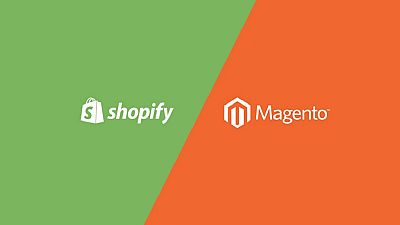e-commerce
Setting up an online business is much easier now than it used to be in the early years of ecommerce. You now have dedicated ecommerce solutions like Magento, Shopify etc that come with built-in functionalities needed for an ecommerce site. So, how should you chose your ecommerce platform when it comes down to comparing the two big players in the ecommerce platform business?
Magento Vs Shopify
Both Magento and Shopify are established and proven ecommerce solutions, two of the best ecommerce platforms. They are both robust and scalable and once you choose one of them, you can stay put without any need for migration as your business scales.
Magento is an open source platform. This offers flexibility, if you know how to code. Magento is basically free, you need not pay to begin using it.
Shopify is a proprietary solution. This means you do not have access to the software source code to change it. Shopify is offered as a SaaS.
Setting it Up
-You need to buy your own hosting with Magento. Shopify provides hosting for your site
-You need to setup and configure Magento according to your needs. Shopify takes care of all this at their end. You can access many templates for both platforms – free and paid
-Shopify does not need technical expertise to setup and use
The Cost
-The basic version of Magento, Magento Community Edition, is free. Shopify basic plan costs $29 per month
-Magento charges no transaction fee, but Shopify does. However, the higher the plan, the lower the Shopify Transaction Fee
-You will need to buy hosting for Magento. Shopify comes with hosting for every plan
-For Enterprise Ecommerce, you need to buy Magento’s Enterprise Edition. Shopify also offers an Enterprise solution, Shopify Plus. Both can be expensive, and the price varies depending on various factors
-With an in-house Magento implementation, you will spend more on running costs – infrastructure, energy costs, software development, IT staff and so on
-With Shopify, the main resources are on their premises and as a SaaS, administration, maintenance and troubleshooting are their responsibility
Technical Support
-You get good technical support only if you buy the Magento Enterprise Edition. With the free Community Edition, you are on your own
-Shopify comes with 24/7 customer care and full Technical Support, for all plans
-Magento and Shopify both have user communities and forums that you can access, to find help from other users on various aspects of the platforms
Customization
-Magento is Open Source and is fully customizable, but you need good coding skills, or you need to hire a developer or a technical team
-Shopify Apps and the ability to customize the front end using the Liquid template language ensures Shopify is flexible enough to handle any of your ecommerce needs
-There is an established marketplace of apps and addons for Magento and Shopify. You can use these readymade extensions to extend and customize Magento or Shopify for your needs
Security
-While both provide a secure environment, Magento’s open source nature means you have to be very careful in your implementation and customization, to test for vulnerabilities and prevent security breaches
-Your IT team should put in place good security measures and keep testing and fixing issues
-Shopify is a hosted solution is offered as a SaaS.and they have put in place strict security measures and always update the software and security patches as soon as they are available, to keep your site secure
-In other words, security, maintenance, bug fixes are all the responsibility of Shopify, while with Magento, this responsibility falls on you
For ECommerce
-Both Shopify and Magento provide great tools for SEO and marketing -You can manage inventory accurately with both Shopify and Magento, and always have up-to-the-second view of stock across all your channels and all your stores
-You can also manage other data – employees, order fulfilment, customer data etc.
-Good data analytics and reporting tools enable you to make optimal use of these data
-Both provide features to control internal access, you can create user accounts and assign permissions
-You can add unlimited products with both Shopify and Magento
-Shopify, as a cloud solution, scales easily with an increase in demand for resources. With -Magento, it depends on the hosting service you have chosen
-Shopify and Magento both enable you to handle delivery and offer various shipping options
-Magento offers a handful of integrated payment gateways. Shopify offers more than 70 integrated payment gateways globally
-With both Magento and Shopify, you can provide different kinds of discounts to customers and create and manage Coupons
-Shopify provides better out-of-the-box security implementations – SSL certificate, PCI Level 1 Compliance
-Shopify also provides better social media integration
While both Shopify And Magento are among the top players in the business, you need to choose the best ecommerce platform for your venture depending on your needs, your resources, and your budget. In essence, Magento is ideal for those who want precise control and customization for their ecommerce solution, and have a strong in-house IT infrastructure and a software development team.
Shopify is best suited for merchants who do not have these in-house resources and want to get started selling products quickly without getting stalled by the nitty gritties of technology, while at the same time want a sound product. Shopify is also ideal for those who want to focus on the front-end and on marketing, customer relations and generating more sales that drives their ecommerce business.














11:11
Jumia leading the e-Commerce revolution in Africa [Business Africa]
11:10
E-commerce: Can Covid growth be sustained? [Business Africa]
11:04
International Monetary Fund: Zambia talks progress [Business Africa]
Go to video
How coronavirus is boosting e-commerce across Africa
06:54
E-commerce striving in Ivory Coast [Business Africa]
05:32
Jumia folds up Cameroon operations [Morning Call]